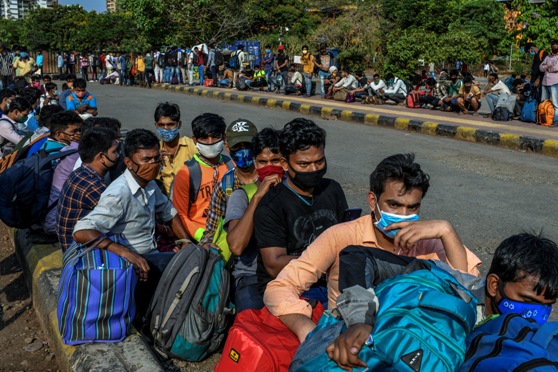Lockdown in New Delhi as India sees new virus record, migrants flee

By Siddhartha Kumar
NEW DELHI – New Delhi announced a one-week lockdown on Monday (19) after a record surge in cases overburdened the Indian capital’s health care infrastructure.
Overall, India, registered 273,810 fresh coronavirus infections and 1,619 deaths on Monday, a new daily record amid a second wave of the pandemic.
The latest figures took the total caseload to 15 million, with 178,769 deaths so far, the Health Ministry website showed.
New Delhi, the worst-hit among Indian cities, will enter lockdown until April 26, Chief Minister Arvind Kejriwal announced, warning the city’s resources were almost at a breaking point in the escalating COVID-19 crisis.
New Delhi and several of the country’s worst-affected states, including western Maharashtra, have complained of shortages of medical oxygen, beds and COVID-19 medicines in hospitals.
“If we don’t impose a lockdown now, we might face a bigger calamity. We took this tough decision taking the situation into consideration,” Kejriwal said. “The six-day lockdown will help us arrange more beds and supplies.”
Kejriwal said intensive care unit beds were almost all used up and oxygen levels were critically low in the city. “We are not trying to scare you … I won’t say the health system has collapsed, but it is really stressed. There are limits to any system,” he said.
Sports complexes and hotels have been turned into facilities to treat Covid-19 patients, officials said.
Government offices and essential services, like hospitals, drug-stores and grocery shops are to remain open during the lockdown.
New Delhi imposed a weekend curfew, but nonetheless reported its highest single-day spike 25,462 cases in the past 24 hours.
Kejriwal also appealed to migrant workers not to leave the city – but news channels showed thousands of labourers reaching bus stations to leave for their homes in the hinterland.
“Work has completely stopped. We will have no food or employment and the situation is uncertain. We will return only when the lockdown is lifted,” a worker told broadcaster NDTV.
India has seen the highest surge in virus cases since the beginning of the pandemic last year.
This was the fifth straight day that more than 200,000 cases were reported, compared to the previous peak in September, which saw nearly 98,000 cases a day.
Posts on Indian social media depicted people pleading for hospital beds, oxygen and drugs. Footage on news channels showed crematoria and graveyards struggling to keep up with deaths.
Former Prime Minister Manmohan Singh, 88, has tested positive for coronavirus and was taken to a Delhi hospital, Congress party spokeswoman Shama Mohamed and news reports said.
Maharashtra and other heavily affected states like Uttar Pradesh, India’s most populous state, have also announced curfews and stricter curbs.
In a key decision, vaccinations in India are to be widened to everyone above 18 years beginning May 1, the government announced on Monday, after Prime Minister Narendra Modi held a series of meetings to discuss medical challenges.
The government presented a new vaccine strategy to augment vaccine production and availability, incentivizing vaccine manufacturers to rapidly ramp up their production as well as attracting new domestic and foreign vaccine manufacturers. Pricing, procurement and distribution of vaccines would be made more flexible.
India began inoculating people in January. So far, only for front-line workers and those above 45 received shots.
The country has administered 123 million doses to date and plans to vaccinate some 300 million people – over a fifth of its 1.3-billion-strong population – by July.
India, which has the second-biggest caseload after the United States, saw a downward trend in infections from the end of 2020, but the numbers began rising again in mid-February.
The surge has been attributed to people being lax about following safety measures, such as wearing masks.
The presence of several mutations of the virus, including the fast spreading one originating in Britain and a local double mutant, have also worsened the situation, experts say.
Big crowds at events like the current regional elections and the Kumbh festival are expected to lead to a further surge in cases.
-dpa

